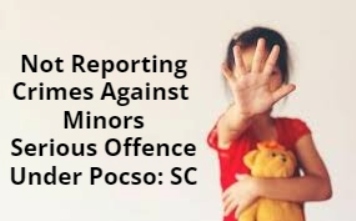

By Sunil Garodia
First publised on 2022-11-04 02:20:45
When a person is brought to a hospital, or even to a doctor's clinic, consequent upon the nature and seriousness of the injury or ailment (for instance if the patient has symptoms of being poisoned), doctors refer the case to the police if they think fit. That is the law for otherwise a crime can go unreported. Similarly, doctors examining minor girls and finding signs of sexual abuse must report the case to the police as it falls under mandatory reporting of offences against minors as per Section 19 of POCSO. But a doctor at a hospital in Rajpura in Chandrapur district of Maharashtra failed to do so in case of 17 minor tribal girls in a school hostel who were subjected to sexual abuse in 2019.
The Bombay HC had quashed the case against the doctor on the premise that the statements made before the police showed that the doctor was not aware that the girls were subjected to sexual abuse. Then what examination did he carry out?
The Supreme Court took a serious view of the matter and overruled the high court judgment. It said that not reporting an offence against a minor was a serious crime under POCSO. The apex court said that "prompt and proper reporting of the commission of offence under the Pocso Act is of utmost importance and we have no hesitation to state that its failure on coming to know about the commission of any offence thereunder would defeat the very purpose and object of the Act". It went on to say that "non-reporting of sexual assault against a minor child despite knowledge is a serious crime and more often than not, it is an attempt to shield the offenders of the crime of sexual assault".
The Supreme Court ruled that the "the impugned judgment resulting in the quashment of the stated FIR and the charge sheet throttling the prosecution at the threshold, without allowing the materials in support of it to see the light of the day, cannot be said to be as an exercise done to secure interests of justice whereas it can only be stated that such an exercise resulted in miscarriage of justice".
There can be no doubt that a doctor examining minors would immediately come to know if they have been sexually abused. Since the abuse in the instant case was going on for many months and the victims were regularly brought to the doctor for treatment, it is clear that the doctor failed in his mandatory duty under POCSO and maybe did so to protect the accused. The Supreme Court rightly set aside the high court order and allowed the prosecution to move against the doctor for committing a serious offence under POCSO.
Picture courtesy: eurojust.europa.eu (caption ours)











